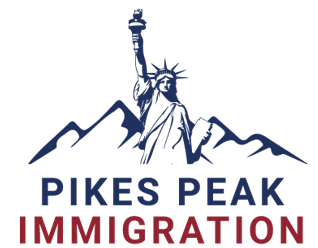Immigration Law Firm Serving Colorado Springs
Request Call Back
Hero Request Form
Trusted Immigration Attorneys with 15 Years of Experience
Keeping families together with creative solutions to complex immigration issues is our mission at Pikes Peak Immigration. Our law firm in Colorado Springs, CO, has experience in all types of immigration cases, including business immigration, family immigration, and immigration defense. In addition to family-based immigration and deportation defense, we specialize in victim-based cases such as U-Visas, VAWA, and asylum.
Also, we have substantial experience representing criminal defendants who are not citizens. We do post-conviction relief cases, advisals, and appeals related to the immigration consequences of criminal convictions. Finally, we have experience representing companies and individuals petitioning for business visas. We're your zealous advocate in court with a true dedication to maintaining family unity. We always put our clients first and keep their best interests our top priority. Contact us today for caring, professional representation.
Meet Alex (English)
Conoce a Alex (Español)
Why Choose Pikes Peak Immigration LLC?
We are one of the few firms in Colorado that litigates immigration cases in federal court. Our founder, Alex McShiras, has litigated cases at the federal level in the Colorado District Court, the 10th Circuit Court of Appeals, and the 5th Circuit Court of Appeals. At the state court level, we have experience litigating cases in a variety of county courts, district courts, the Colorado Court of Appeals, and at the Colorado Supreme Court.
Alex has devoted much of his practice to litigation in the Immigration Courts and at the Board of Immigration Appeals, and he is also admitted to practice at the United States Supreme Court.
Family Immigration
Reuniting families and guiding individuals through the naturalization process are core aspects of our practice. We handle all aspects of family-based immigration, including petitions for spouses, children, and parents. Additionally, we assist lawful permanent residents and other eligible individuals in navigating the path to U.S. citizenship, ensuring they meet all requirements and successfully complete the naturalization process.
Business Immigration
Navigating the intricacies of business immigration requires in-depth legal knowledge. At Pikes Peak Immigration, we assist businesses and entrepreneurs in securing the necessary visas and permits to operate within the United States. From H-1B visas to investor visas, our expertise covers a wide spectrum of business immigration needs tailored to your specific business objectives.
Deportation Defense
Facing deportation can be an overwhelming and frightening experience. At Pikes Peak Immigration, we offer robust deportation defense services to protect our clients' rights and work towards favorable outcomes. We explore all available legal avenues to prevent deportation, including appeals, waivers, and asylum applications, ensuring our clients have the best possible chance of remaining in the United States.
DUI & Traffic Defense
In addition to our immigration services, Pikes Peak Immigration offers skilled defense for clients facing DUI and traffic-related charges. Our attorneys understand the serious implications these charges can have on an individual's immigration status and overall well-being. We provide comprehensive legal representation to challenge DUI and traffic violations, aiming to minimize the impact on our clients' lives.
Crimmigration
At Pikes Peak Immigration, we understand how criminal charges can profoundly affect an immigrant’s life and future in the United States. Our specialized crimmigration services combine criminal law expertise with immigration knowledge to provide strategies that protect both your legal record and your right to remain in the country, guiding you through every step of this complex legal intersection.
About
At Pikes Peak Immigration LLC, our mission is to keep families together by providing creative solutions to complex immigration challenges. Based in Colorado Springs, CO, our law firm handles a wide range of immigration cases, including business immigration, family immigration, and immigration defense. In addition to family-based immigration and deportation defense, we have specialized experience with victim-based cases, including U-Visas, VAWA petitions, and asylum.
Customer Testimonials

Working with Alex and his team was a pleasure. They answered all of our questions thoroughly and worked hard for us every step of the way. They truly care and it shows in their work. Very honest and down to earth people who can be highly trusted with your case.
Karen O-C.

"Muchas gracias por toda su ayuda,exelente abogado recomendado al 100% gracias por ayudarnos en nuestro proceso.”
Jairo R.

"Alex has been an amazing lawyer. He has helped my family in different situations, and I'm grateful to have found him back in 2014 when he helped me with my DACA. Thank you for your hard work!"
Nancy R.

"Excelente trabajo y atención! Gracias por darnos la seguridad que necesitábamos mi esposo y yo al poner nuestro caso en sus manos, gracias por responder todas y cada una de nuestras dudas, abogado Mcshiras y todo su personal, mil gracias!"
Juana S.

They make you feel like your case is their top priority and are always willing to answer any questions you may have. They were more than willing to help and talk through the immigration process. I would highly recommend their services.
Kevin Z.

Working with Pikes Peak Immigration was a relief for such a stressful process. Alex is very knowledg[e]able, but mostly personable and empathetic, which was the most important thing for me when dealing with my immigration process. Highly recommend him and his firm. Very grateful for their help!
Sara H.

Alex McShiras and his team are truly amazing! . . . . We are very happy to have chosen them for our immigration journey. Alex and his team have a lot of passion for their work and compassion for their clients. God Bless, Pikes Peak Immigration for their help in bringing families together.
Ne’ C.

Alex lawyer and assistant . . . . actively listened to all my needs, gave a reasonable plan, and solved all the problems. I am very moved by this. I trust him and rely on him! I sincerely thank all the staff of the law firm for their dedication to me! Such an excellent law firm is very recommended!
Amber
Share your experience with Pikes Peak...
At Pikes Peak Immigration LLC, we take pride in providing exceptional legal representation services to our clients. We would be grateful if you could share your thoughts about our firm with others. Your feedback helps us improve and helps others make informed decisions. Please take a moment to leave a review of Pikes Peak Immigration LLC and let others know what you think.
Our Blogs










Share On: